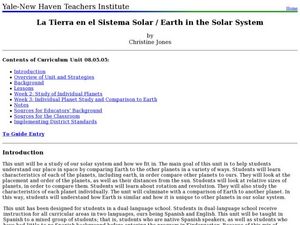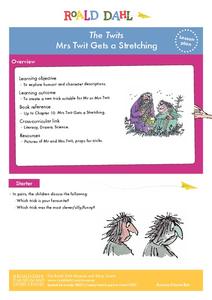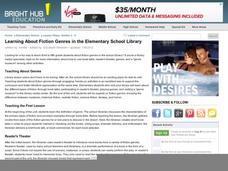ReadWriteThink
Webcams in the Classroom: Animal Inquiry and Observation
Boost observational skills with an inquiry-based lesson that takes scholars on a virtual field trip. With help from webcams, learners observe animals in a zoo or aquarium. Observations go into a journal and a discussion is held to review...
Curated OER
Buoyancy: Integrating Science and Literature
Integrate science and literature by using the scientific method to test the veracity of the floating peach described in Roald Dahl's James and the Giant Peach. Clips from a Bill Nye: The Science Guy episode about buoyancy frontload...
Scholastic
Ready to Research Owls
Researching facts about owls can be a hoot for your class. Let them wisely collaborate on this writing project. The resource is the second part of three parts. It is best to use all three lessons in order.
Mary Pope Osborne, Classroom Adventures Program
Mummies in the Morning Egyptian pyramids, hieroglyphics
Visit the Magic Treehouse and take your class on a trip through time with a reading of the children's book Mummies in the Morning. Using the story to spark an investigation into Egyptian culture, this literature unit engages...
Curated OER
A Walk in the Tundra
Discuss the environment of the Arctic tundra using this resource. The focus of this lesson is the story A Walk in the Tundra by Rebecca L. Johnson. The appealing illustrations are bound to captivate your class! After reading the story,...
San Francisco Public Utilities Commission
Water from the Well
How much water does it take to brush your teeth? How about to wash your clothes? Perform an experiment that measures water usage in everyday tasks and compares them to the days before indoor plumbing, specifically the California gold...
Curated OER
The Peanut Wizard
Students read and discuss information regarding George Washington Carver and how the peanut became cultivated in the southern colonies of the United States. In this George Washington Carver lesson, students develop vocabulary that...
Curated OER
Earth in the Solar System
A three-week unit designed to be completed in an elementary level, dual-language immersion classroom, this resource includes several lessons intended to introduce young learners to the solar system, the Earth and how the Earth compares...
Alliance Theater
The Jungle Book Post-Show STEAM Lesson
An ecosystem is really just the flow of energy through many different living organisms. A study of Rudyard Kipling's The Jungle Book leads to an environmental science activity in which learners study how various factors can affect...
Curated OER
Barrels and Buckets: Access to Water - What Would It Be Like to Live in Africa?
Learners compare water access in the United States with that of Africa. In this water access lesson, students located Ghana and Kenya on a globe before reading Peace Corps Volunteer accounts of the difficulty of accessing clean water....
Curated OER
What's in a Name?
Learners explore the plants that grow in Glacier National Park. In this plant biology activity, students invite a guest speaker to speak about plants that grow in Glacier National Park, as well as the scientific names for the plants....
Baylor College
What's That Food?
Get things cooking with the first lesson plan in this series on the science of food. Working in small groups, young scientists make and record observations about different mystery foods. These descriptions are then shared with the class...
Curated OER
Investigate Science Using Crayfish
Young scientists discover the importance of scientific investigation by observing live crayfish. They carefully observe the patterns of crayfish in different environments. Then they discuss their conclusions and define what all living...
Curated OER
In Case of Emergency
A natural disaster could strike at any time: do your learners know the school and community emergency plans? Start the school year by honing research and speaking skills in a practical way with this preparedness lesson plan. Youngsters...
Curated OER
A Seashell Lesson: Writing for Detail and the Scientific Process
Practice descriptive language in this lesson, which prompts elementary and middle schoolers to write detailed descriptive sentences describing a seashell. They write a description of a shell, create an illustration, and other students...
Monterey Bay Aquarium
What's in a Name?
Combine art and word analysis in a lesson about genus and species. Elementary children sleuth out the meaning of scientific names for a number of shark species using a prefix and suffix definition chart. They then draw an image of the...
Curated OER
I Want a Job in Agriculture
Upper graders explore agriculture careers. They brainstorm possible careers in the agricultural field and choose a career of interest to them. Everyone writes a paper about different aspects of this career using the six traits of...
Berkshire Museum
Nature Journaling: Experience the Outdoors Through Writing and Drawing
Step into the great outdoors and develop young scientists' skills of observation with a nature journaling lesson plan. Given a specific focus or goal, children practice making and recording observations of nature through written...
Berkshire Museum
Meet a Naturalist: Researching, Writing, Interviewing
Young scholars reach out into the community and learn about different environmental science careers in this inquiry-based instructional activity. Beginning with a short research assignment, children gain background knowledge about...
Roald Dahl
The Twits - Mrs Twit Gets a Stretching
A cork, a rubber snake, and a bucket of mud may not seem like the best materials for washing a car, but they are in The Twits. The fifth activity in an 11-part unit designed to accompany The Twits by Roald Dahl has readers role play...
Illinois Department of Natural Resources
Section One: What is Biodiversity?
Four intriguing and scientific activities invite learners to explore the natural resources of their town. The activities cover concepts such as genetic traits, organizing species in a taxonomy, the differences between different species...
Illinois Department of Natural Resources
Section Two: Why is Biodiversity Important?
Explore soil, genetic traits, natural resources, and pollution in a series of lessons that focus on biodiversity. Kids complete experiments to learn more about the importance of varied genes and organisms in an ecosystem.
Curated OER
Beary O'Mometer Learns About Careers In Meteorology
Students explore the field of meteorology. In this meteorology lesson, students explore weather-related careers as they research the field of study as well as various weather concepts. Students interview meteorologists, write business...
Curated OER
Learning About Fiction Genres in the Elementary School Library
Teaching about fiction genres can be challenging. The lesson here, designed for library media specialists, offers a fun way to do it. In the lesson, learners visit the library and learn about the different types of fiction through book...

























